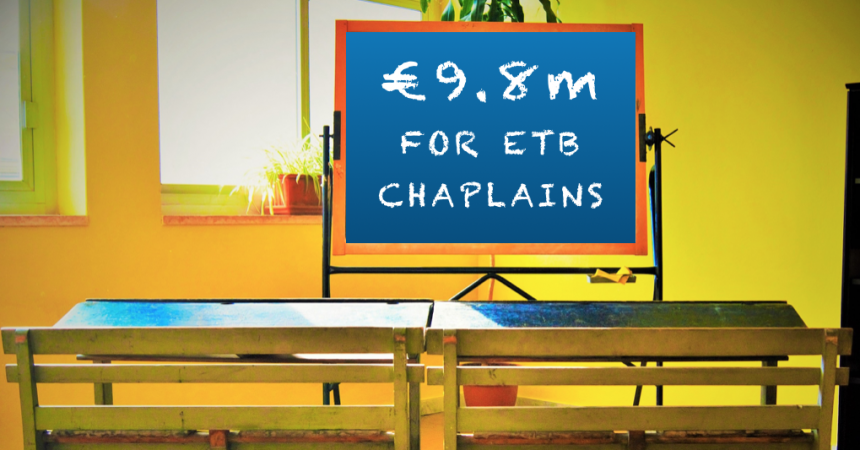
Another €9.8 million of State money for faith formation in ETB schools
The State is still paying €9.8 million a year for Catholic and Church of Ireland Chaplains to engage in faith formation in some ETB schools. It is mostly Catholic Chaplains that are paid by the State as they are in the majority.
The State sanctions the payment of Chaplains for faith formation in ETB schools despite the fact that over half of second-level school are publicly funded denominational schools. ETB schools and colleges operate in the same manner as denominational schools and are not the alternative to denominational schools. They are part of the problem.
Here are the figures for second-level. ETB schools are typically Multi-Denominational or Inter-Denominational.
- 344 Catholic
- 202 Multi-Denominational
- 150 Inter-Denominational
- 22 Church of Ireland
- 2 Quaker
- 1 Jewish
- 1 Methodist
- 1 Presbyterian
Religious parents also have a right in all ETB schools to religious instruction and worship for their children.
Payment of Catholic and Church of Ireland Chaplains challenged in the Courts
The state funding of Chaplains in Community Schools was challenged in the courts by the Campaign to Separate Church and State.
In 1998 the Supreme Court found that the state funding of Chaplains in Community schools was not an endowment of religion (forbidden by the Constitution under Article 44.2.2). Instead, the State was helping parents with the religious education of their children under Article 42.1 of the Constitution, which included faith formation under Article 42.4.
Article 42.1 of the Constitution guarantees the inalienable rights of parents in relation to the religious and moral, intellectual, physical and social education of their children.
Justice Keane in the Campaign case at the Supreme Court said that:
“I would entirely agree with his conclusion that, in any event, they are constitutionally sanctioned, having regard to the recognition in Article 42.4 of the rights of parents in relation to the religious and moral formation of their children.”
In essence, the Supreme Court has found that the funding of Chaplains for faith formation in Community schools is sanctioned by Article 42.4 of the Constitution. Article 42.4 states that:
“The State shall provide for free primary education and shall endeavour to supplement and give reasonable aid to private and corporate educational initiative, and, when the public good requires it, provide other educational facilities or institutions with due regard, however, for the rights of parents, especially in the matter of religious and moral formation.”
Religious Parents in ETBs are not obliged to settle (merely) for religious instruction
When the case went to the Supreme Court, Justice Barrington said that parents need not settle merely for religious instruction in Community schools under Article 44.2.4. The Supreme Court found that religious instruction under Article 44.2.4 was not the same as religious formation under Article 42.4:
“In Community Schools it is no longer practicable to combine religious and academic education in the way that a religious order might have done in the past. Nevertheless parents have the same right to have religious education provided in the schools which their children attend. They are not obliged to settle merely for religious “instruction”. The role of the Chaplain is to help to provide this extra dimension to the religious education of the children.”
Religious Instruction comes under Article 44.2.4 of the Constitution and that states:-
“Legislation providing State aid for schools shall not discriminate between schools under the management of different religious denominations, nor be such as to affect prejudicially the right of any child to attend a school receiving public money without attending religious instruction at that school.”
Justice Costello in the Campaign case at the High court had defined the right to religious formation under Article 42.4 as:
“Religious formation of a child involves familiarising the child not just with religious doctrine but with religious practice (by attendance at religious services) and developing the child’s spiritual and religious life by prayer and bible reading and I think that the Constitution should be consrued so as to relfect this meaning. In the case of parents who profess the Catholic faith the religious formation of their children involves ensuring that their children attend Mass and that they pray and receive the sacraments on a regular basis.”
The Supreme Court has found that it is because of the rights of parents under Article 42.1 that they need not settle merely for religious instruction under Article 44.2.4, but have a right to religious formation under Article 42.4 of the Constitution for their children. Consequently, this is the Constitutional basis for the funding of Catholic and Church of Ireland Chaplains in some ETB schools and colleges as otherwise this funding could be seen an endowment of religion.
Religious discrimination in ETBs
Most Catholic families have access to denominational second-level schools, and the State pays Catholic and Church of Ireland Chaplains for faith formation in some ETBs.
In addition, all religious parents have a right to have religious instruction and worship for their child in ETB schools and colleges (Deeds of Trust for Community Schools – Model Agreement Designated Community Colleges – Circular Letter 73/74 non designated Community colleges).
However, if you are from a non-religious family, the majority of ETBs won’t supervise your child outside faith formation or religious instruction classes, and they are not offered another subject if they do manage to exercise their Constitutional right to not attend.
ETB schools and colleges elevate the rights of religious families in Article 42.1 of the Constitution over non-religious families who are equally protected by Article 42.1 of the Constitution. Atheist Ireland will continue to challenge this religious discrimination.







0 Comments
No comments!
There are no comments yet, but you can be first to comment this article.